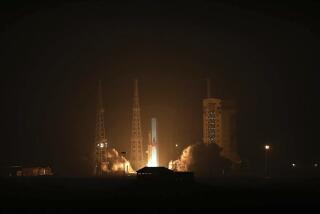Iran Rules the Airwaves
PRAGUE, Czech Republic — With the military part of the war completed, the U.S. needs to turn its attention to the war of words being waged in Iraq.
As of May 15, none of the country’s official broadcast media had resumed operations, which, in a country starved for news and information, has left a real vacuum. The U.S. has made some attempts to fill the void, but so far it is Iran that has made the greatest inroads.
Shortly after the fall of Baghdad, a Tehran-backed group of Iraqi Shiite exiles known as the Supreme Council for the Islamic Revolution in Iraq began broadcasting its Voice of the Moujahedeen radio programming on the frequency formerly used by Iranian state radio. Its programs feature statements from the supreme council’s leader, Ayatollah Mohammed Bakr Hakim, and from the Iranian leadership, and it espouses views advocated by Tehran. Its commentaries have claimed that the war in Iraq was meant to help “the Zionist entity,” and that the U.S. and Britain are occupiers who should be confronted by the Iraqi people.
Tehran is not confining itself to radio broadcasting. Al Alam, an all-day Arabic language television news channel run by the Iranian government, began transmitting programs in March that can be picked up with a regular television antenna in Iraq.
The new programming tailored to Iraqis is part of a larger strategy of the Tehran government, which has worked hard to broadcast its message throughout the region. The external service of the Voice of the Islamic Republic of Iran could be heard on AM and shortwave in Iraq even before the war. Tehran also operates two radio networks with a Palestinian focus. The Voice of the Palestinian Islamic Revolution, which has been broadcasting for two decades, features statements from Hamas, the Palestinian Islamic Jihad and the Al Aqsa Martyrs Brigade, all of which are considered terrorist organizations by the United States. The commentaries glorify violence against Israel by praising Palestinians who participate in suicide bombings, and they encourage future acts of resistance. The Voice of the Al-Aqsa Intifada, which is about 2 years old, features anti-Israeli statements from Iranian leaders as well as quotes from Hezbollah’s leader, Sheik Hassan Nasrallah.
The new operations in Iraq are not particularly sophisticated, but they are designed to promote anti-Americanism while encouraging close relations with Iran. Broadcasts refer to Operation Iraqi Freedom as the “War for Control,” and the station carries extensive video footage of dead and wounded Iraqis. On May 1, Hakim appeared on an Al Alam program to accuse coalition forces of committing atrocities against civilians. This report was followed immediately by the news that Israeli troops in Gaza had killed eight Palestinians and wounded many others. The implication? Iraqis and Palestinians are facing similar conditions of oppression.
Tehran shared the U.S. desire to see Saddam Hussein overthrown. Now Tehran recognizes that it must act quickly to influence Iraq’s future. Iran’s advantage under these circumstances is that, like Iraq but unlike most other Muslim states, its population is predominantly Shiite. Iraqi Shiites were severely repressed during Hussein’s rule, and many of them sought sanctuary in Iran. Tehran is trying to build on whatever goodwill and gratitude exist.
Still, Baghdad residents have so far given Iranian broadcasts mixed reviews. Some Iraqis see Al Alam as a welcome change from the state propaganda they used to receive. More sophisticated viewers perceive it as Iranian propaganda and resent its anti-Americanism. Secular and non-Shiite Iraqis are suspicious of Iranian intentions, furthermore, and they do not want to see an Iranian-style theocracy recreated in their own country now that they have been freed of Hussein’s dictatorship. Finally, there is lingering antipathy from the countries’ 1980-88 war and from the centuries-old Arab-Iranian divide.
But even some who are skeptical of the broadcasts rely on them, as they fill a major void in the Iraqi media landscape. Baghdad residents have complained to Western journalists that coalition television broadcasts are difficult to receive, and although satellite receivers are available in small numbers, they are rather costly for average Iraqis. Their only realistic option right now, therefore, is Al Alam.
As stability returns to Iraq, as essential services are restored and as a representative government begins functioning, Al Alam’s importance is likely to fade. But it is important for the U.S. to get its message out in a way that helps Iraqis recognize that, despite Tehran’s claims, coalition forces are there to help them and to restore their country to its rightful place in the international community.
The reach of Tehran’s broadcasts to the rest of the Arab world is more worrisome. They maintain not even a veneer of objectivity, frequently blaming Arabs’ problems on the United States. They serve as a platform for terrorists to espouse their views and encourage violence. They draw parallels between events in Iraq and the Palestinian situation.
Although the Iranian attempts to influence the Arabic-speaking world aren’t new, they took on a new urgency when the war started in Iraq. This could be seen in the Friday prayer sermon broadcast April 11. Iran’s top religious and political official, Ayatollah Ali Khamenei, gave the sermons that day, and, in a departure from usual practice, he read from a script, indicating the care that went into the sermons’ wording. Even more unusual, he delivered most of the second sermon in Arabic, rather than in Persian, clearly aiming his message beyond the borders of his country.
The “crimes” committed by British and American invaders surpassed those committed by Hussein, Khamenei said, dismissing coalition claims that they were helping the Iraqi people. The U.S. and Britain had sinister goals: controlling Iraqi oil, gaining a foothold in the Middle East and suppressing the intifada. The Iranian supreme leader predicted that an emerging resistance would prevent the realization of such American and British dreams, and he promised that Iran would not be neutral in any struggle between the Iraqi people and its occupiers. “Our political help goes to every wronged people who have experienced aggression, and this is our line from which we will not deviate,” Khamenei said.
These messages have been repeated in all the Friday sermons broadcast since then. Some have gone further. On May 2, Ayatollah Ahmad Jannati delivered a sermon warning that now that Iraq had been conquered, the U.S. would look to occupy other lands. Islamic countries should “stand up to America and Israel,” he warned. As for the Iraqi people, he said: “They have no option but to resort to intifada and martyrdom.”
An estimated 10% of Iraqis own television sets, so one could question the effect of Al Alam and the need to counter it in kind. Iranian radio broadcasts, on the other hand, can be heard in Iraq on a dozen AM frequencies and three FM frequencies, and countering this will require a decisive response with content attuned to local culture.
Iraqis must hear from people to whom they can relate -- their Iraqi peers, not just westernized intellectuals and elites. Western broadcasting should focus on the positive contributions being made by coalition forces, such as the rebuilding of Iraq’s infrastructure and the restoration of water and electrical services. Iraqis also should know that the rule of law is returning to their country, and it will be different than the repression they lived under previously. They need to be reminded that they are better off now than they were under Hussein. This will go far in countering Tehran’s disinformation and its call for violence.
More to Read
Sign up for Essential California
The most important California stories and recommendations in your inbox every morning.
You may occasionally receive promotional content from the Los Angeles Times.










